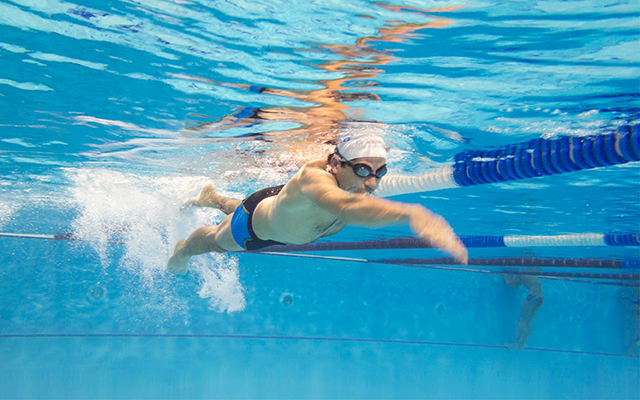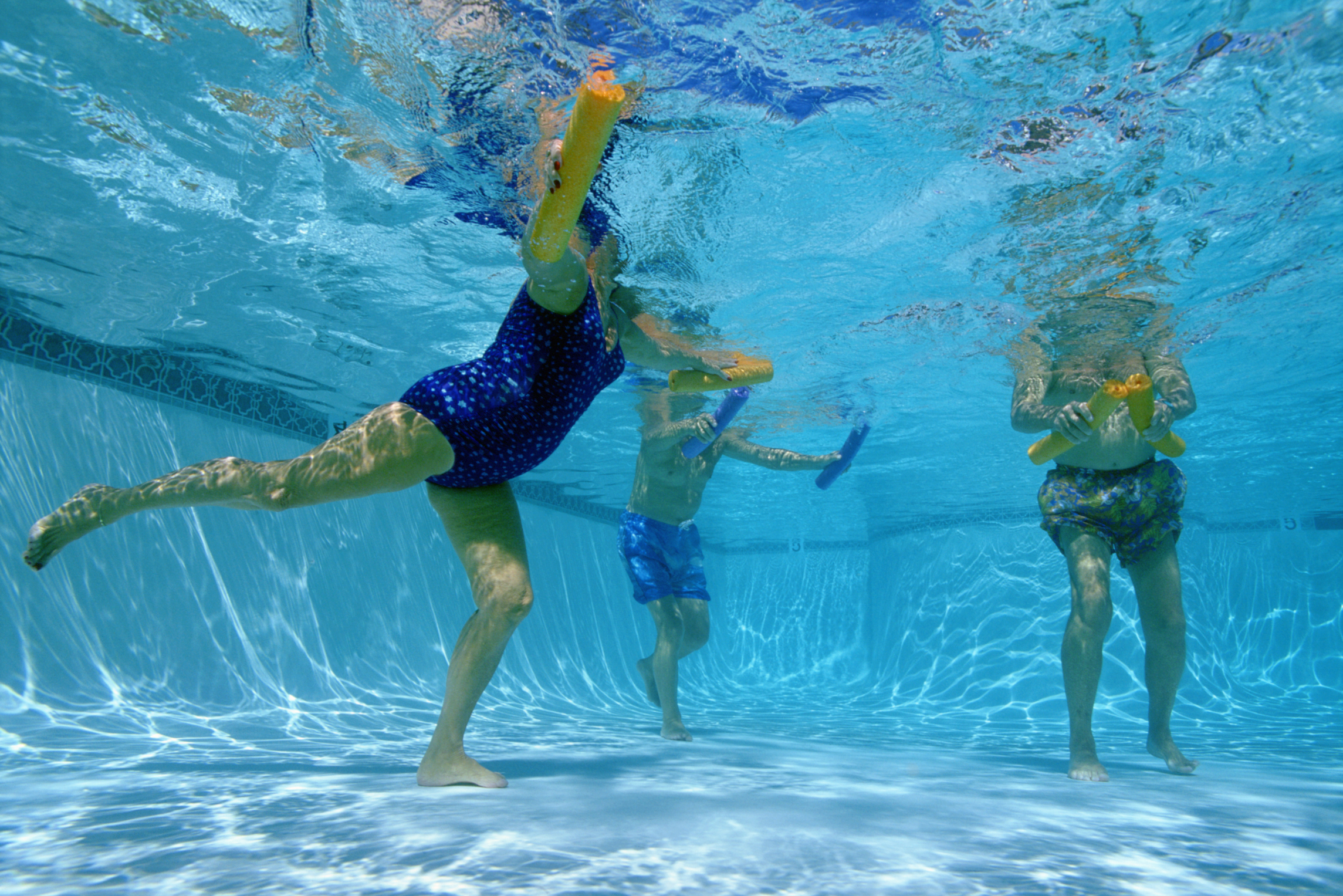Exercise Daily – When it comes to staying fit and healthy, we often think about hitting the gym or going for a run. But there’s another fantastic way to boost your health and well-being, and it involves taking the plunge into the cool, refreshing waters of a swimming pool. Swimming isn’t just a recreational activity; it’s a full-body workout that offers a plethora of benefits for your physical and mental health.
1. Cardiovascular Health: A Strong Heart in Every Stroke
Swimming is a fantastic way to get your heart pumping. It’s a cardiovascular exercise that increases your heart rate, which, in turn, strengthens your heart. As you glide through the water, your heart works harder to supply oxygen to your muscles, improving overall circulation and reducing the risk of heart disease.
The Heart of the Matter
Your heart is the engine that keeps your body running, and like any engine, it needs regular maintenance to stay in tip-top condition. When you swim, your heart rate increases, and it has to pump blood more vigorously. This extra effort strengthens your heart muscles, making it more efficient at its job.
Aerobic Awesomeness
Swimming is an aerobic exercise, meaning it gets your heart and lungs working together to deliver oxygen to your muscles. The sustained effort required in swimming helps improve your cardiovascular endurance, which is crucial for maintaining overall health.
Say Goodbye to the Silent Killer
High blood pressure is often referred to as the “silent killer” because it can go unnoticed for years. The good news is that swimming can help regulate blood pressure. As your heart gets stronger, it pumps blood more effectively, which can lead to better blood pressure control and a reduced risk of hypertension.
Cholesterol Control
Swimming is like a broom for your arteries. It helps sweep away bad cholesterol (LDL) and increases good cholesterol (HDL). This balance is essential for a healthy heart and reduced risk of arterial blockages.
Stress Reduction
In our fast-paced world, stress can take a toll on our hearts. Swimming provides a double benefit by being both a physical workout and a mental escape. The calming effect of water and the rhythmic motion of swimming can lower stress levels, which is beneficial for your heart health.
A Lifelong Investment
Perhaps one of the most significant advantages of swimming for cardiovascular health is that it’s a lifelong activity. Unlike some high-impact sports that may become challenging with age, swimming remains accessible and gentle on the body. This means you can enjoy its benefits well into your golden years.

2. Muscle Toning: Sculpt Your Body Underwater
Swimming engages various muscle groups, making it a superb choice for toning your body. Each stroke works on different muscles, from your arms and shoulders during the freestyle to your legs and glutes during the breaststroke. It’s like a full-body workout without the need for complicated gym equipment.
A Full-Body Symphony
One of the incredible benefits of swimming is that it engages multiple muscle groups simultaneously. Every stroke you take works on different areas of your body, creating a harmonious symphony of movement.
- Freestyle: This classic stroke works wonders for your upper body. Your arms, shoulders, and chest are heavily involved as you pull yourself through the water.
- Breaststroke: If you want to target your legs and glutes, the breaststroke is your go-to. The kicking motion engages your lower body, helping to shape and strengthen those important muscle groups.
- Backstroke: As the name suggests, this stroke focuses on your back muscles. It’s an excellent way to improve posture and tone the muscles that support your spine.
- Butterfly Stroke: The butterfly is an intense full-body workout. It engages your core, chest, shoulders, and legs, making it a powerful stroke for overall muscle toning.
Low-Impact, High Results
Unlike some high-impact exercises that can be tough on your joints, swimming is gentle and low-impact. The buoyancy of the water reduces the strain on your joints, making it accessible for people of all fitness levels. This means you can sculpt your body without the risk of injury.
Building Lean Muscle
Swimming helps you build lean muscle mass. Unlike bodybuilding, which can lead to bulky muscles, swimming promotes long, lean muscles that contribute to an elegant and toned appearance.
Aerobic Benefits
In addition to muscle toning, swimming provides excellent cardiovascular benefits. It’s an aerobic exercise that elevates your heart rate, helping you burn calories and shed excess fat. The result? Those beautifully toned muscles become even more visible.
Consistency is Key
To see significant results in muscle toning, consistency is essential. Aim to swim regularly and vary your strokes to target different muscle groups. Over time, you’ll notice increased muscle definition and a more sculpted physique.

3. Weight Management: Dive into Fitness
If you’re looking to shed some pounds or maintain a healthy weight, swimming is an ideal choice. It’s a low-impact exercise that burns calories efficiently. Plus, the water’s buoyancy reduces the impact on your joints, making it suitable for people of all fitness levels.
Calorie Burn Underwater
Swimming is a calorie-burning powerhouse. Every stroke you take requires effort, and that effort translates into calories burned. Depending on your intensity and stroke choice, you can torch a significant number of calories in a single swim session. Plus, the resistance of the water adds an extra challenge, boosting your metabolism.
Low-Impact Advantage
One of the standout features of swimming is its low-impact nature. Unlike high-impact sports that can strain your joints, swimming is gentle on your body. The buoyancy of the water reduces the risk of injury, making it an excellent choice for those with joint issues or anyone looking for a sustainable and comfortable way to exercise.
Full-Body Engagement
Swimming engages a wide range of muscle groups simultaneously. It’s a full-body workout that tones and sculpts your muscles while burning calories. Your arms, legs, core, and back all get a piece of the action, helping you build a lean and toned physique.
A Consistent Routine
Consistency is key when it comes to weight management, and swimming offers an enjoyable way to stay committed to your fitness goals. The water provides a cool and inviting environment, making it easier to stick to a regular exercise routine.
Improving Metabolism
Regular swimming can rev up your metabolism, even after you’ve left the pool. This means you’ll continue to burn calories even when you’re not swimming, which is a fantastic advantage in your weight management journey.
Stress Reduction
Stress can often lead to overeating or unhealthy food choices. Swimming, with its calming and meditative qualities, can help reduce stress, making it less likely for you to turn to comfort eating.
A Balanced Approach
Remember, weight management isn’t just about exercise; it’s also about a balanced diet. Swimming pairs perfectly with a healthy eating plan to help you achieve and maintain your desired weight.
Setting Goals and Tracking Progress
To make your weight management journey more motivating, set goals for your swimming sessions. Whether it’s swimming a certain number of laps or increasing your swim time, having targets to reach can keep you motivated and on track.
4. Stress Relief: The Serenity of the Water
Swimming isn’t just about physical health; it’s also a powerful stress-reliever. The rhythmic motion of strokes combined with the soothing sensation of being in water can help calm your mind, reduce stress, and improve your overall mental well-being.
Embrace the Therapeutic Waters
Swimming isn’t just about physical exercise; it’s also a powerful form of therapy for your mind. The moment you slip into the water, you leave behind the chaos of the world and enter a realm of tranquility.
Rhythmic Relaxation
The rhythmic motion of swimming is almost meditative. With each stroke, you find a soothing rhythm that syncs with your breathing. This repetition is like a calming mantra that drowns out the noise of daily life.
Buoyant Bliss
The sensation of being in water is inherently comforting. The buoyancy of the water cradles your body, relieving pressure on your joints and muscles. It’s a gentle, all-encompassing hug from nature.
Mental Detox
Swimming offers a unique opportunity to detox your mind. As you glide through the water, your thoughts become clearer, and the worries of the day start to fade. It’s as if the water has a magical power to wash away your mental burdens.
Stress Reduction Hormones
Swimming triggers the release of endorphins, those delightful “feel-good” hormones. They act as natural stress relievers, leaving you with a sense of well-being and positivity after your swim.
Time for Reflection
The solitude of the pool gives you time to reflect. Whether it’s pondering life’s challenges or simply enjoying a moment of mindfulness, swimming offers a unique space for self-discovery.
Quality Sleep
The relaxation induced by swimming can lead to improved sleep quality. A peaceful swim session can help you drift into a more restful slumber, ensuring you wake up refreshed and ready to face the day.
Social Connection
Swimming doesn’t have to be a solitary activity. Joining a swim class or club can foster social connections, providing an additional layer of support and stress relief.
A Lifelong Practice
Unlike some stress-relief methods that may have limitations, swimming is a lifelong practice. You can enjoy its calming benefits throughout your life, adapting it to your changing needs and circumstances.

5. Flexibility and Balance: The Aquatic Ballet
Swimming involves a range of movements that enhance flexibility and balance. As you navigate the water, your body constantly adjusts to maintain stability, which contributes to better posture and agility in daily life.
Fluid Movements
Swimming is all about fluid, continuous movements. Each stroke requires a balance of power and finesse, much like a dancer executing a choreographed routine. This constant motion stretches and tones your muscles, promoting flexibility.
Balance in Every Stroke
Maintaining balance in the water is essential. As you swim, your body constantly adjusts to keep you afloat and moving in the right direction. This engages your core and improves your balance, which can translate into better stability in your daily life.
Improved Posture
Swimming encourages good posture. To maintain an efficient stroke, you need to keep your body aligned. Over time, this translates into improved posture both in and out of the pool.
Enhanced Range of Motion
Swimming involves a wide range of motions, from the sweeping arcs of your arms in freestyle to the frog-like kick of the breaststroke. These movements increase your joint flexibility, allowing you to move more freely.
Injury Prevention
The low-impact nature of swimming makes it an ideal choice for those looking to prevent injuries or recover from them. It’s gentle on your joints while still providing an excellent workout.
Mindful Movement
Swimming requires a level of mindfulness. As you focus on your strokes and rhythm, you become more attuned to your body. This mindfulness can carry over into your daily life, helping you make conscious choices for better health.
A Lifelong Skill
Just like riding a bike, swimming is a skill you never truly forget. This means you can enjoy its flexibility and balance benefits throughout your life, regardless of age.
Cross-Training Advantage
Swimming complements other forms of exercise. If you engage in activities that require flexibility and balance, like yoga or dancing, swimming can enhance your performance by providing a unique form of cross-training.
Stress Relief Bonus
The calming effects of water and the rhythmic nature of swimming also contribute to stress relief, which can indirectly support your flexibility and balance by reducing tension in your body.

6. Respiratory Health: Breathe Easier
Swimming requires controlled breathing. It strengthens your respiratory muscles and increases lung capacity. This can be especially beneficial for individuals with asthma or other respiratory conditions.
Controlled Breathing
Swimming demands controlled breathing. As you glide through the water, you need to coordinate your breath with your strokes. This controlled breathing exercise strengthens your respiratory muscles, including the diaphragm, which plays a crucial role in the breathing process.
Increased Lung Capacity
Swimming also improves lung capacity. Inhaling deeply and exhaling fully while swimming increases the amount of oxygen your lungs can hold. Over time, this expanded lung capacity can lead to better overall respiratory function.
Asthma-Friendly Exercise
For individuals with asthma or other respiratory conditions, swimming can be particularly beneficial. The warm, humid environment of an indoor pool can help soothe airways and make breathing more comfortable. Plus, the controlled breathing techniques in swimming can improve asthma control.
Cardiovascular Fitness
Swimming is a cardiovascular exercise, meaning it gets your heart pumping and increases your heart rate. This elevated heart rate enhances overall circulation, ensuring that oxygen-rich blood reaches your muscles and vital organs efficiently.
Stress Reduction
Reducing stress is another way swimming promotes respiratory health. Stress and anxiety can lead to shallow breathing patterns, which aren’t optimal for lung function. Swimming’s calming effect helps relax your body and encourages deeper, more effective breathing.
Better Oxygen Utilization
Swimming also teaches your body to use oxygen more efficiently. The combination of cardiovascular exercise and controlled breathing can lead to improved oxygen utilization, meaning your body gets more out of each breath.
Enhanced Lung Efficiency
The rhythmic strokes of swimming promote consistent and efficient breathing patterns. This can be especially valuable for those looking to optimize their lung function for activities beyond the pool.
Lifelong Benefits
Just like swimming itself, the benefits for your respiratory health are lifelong. Whether you’re young or young at heart, you can enjoy improved lung function and easier breathing for years to come.
A Breath of Fresh Air
So, the next time you’re in the pool, take a moment to appreciate the way swimming enhances your respiratory health. Each stroke is like a breath of fresh air for your lungs, helping you breathe easier and live life to the fullest. Dive in and let the water be your ally in the quest for better respiratory well-being.
7. Social Engagement: A Pool of Friends
Swimming is a social activity that can be enjoyed with friends and family. Joining a swim class or a local swim club can not only improve your physical health but also provide a sense of community and connection.
Swimming isn’t just about the rhythmic strokes and the soothing embrace of water; it’s also a gateway to a vibrant social community. When you take the plunge into swimming, you’re not just entering the pool; you’re entering a pool of friends and like-minded individuals who share your love for this refreshing sport.
Community Connection
Swim clubs, classes, and teams are more than just places to work on your strokes; they’re places to forge lasting connections. Joining a swim community can introduce you to people from all walks of life who share your passion for the water.
Training Buddies
Having workout partners can make exercise more enjoyable and motivating. In swimming, you’ll find dedicated training buddies who will cheer you on, challenge you to improve, and provide valuable support along your journey.
Competitive Camaraderie
If you have a competitive spirit, swimming offers plenty of opportunities to engage with like-minded individuals. Participating in swim meets and competitions can be a thrilling experience, and you’ll bond with fellow swimmers as you strive for your personal bests.
Learning and Sharing
Swimming is a skill that can be refined over a lifetime, and the learning never stops. Joining a swim group or class can provide access to experienced swimmers who are more than willing to share their knowledge and tips.
A Social Escape
Swimming isn’t just about physical exercise; it’s also a mental escape. The calming effects of water and the repetitive nature of strokes can create a serene atmosphere for conversation and connection.
Support and Encouragement
In the world of swimming, everyone understands the challenges and triumphs of the sport. Whether you’re aiming to improve your technique or reach a personal goal, your swimming friends will be there to offer support, advice, and encouragement.
Shared Experiences
There’s something unique about the shared experiences of early morning practices, the satisfaction of hitting a personal best, or the camaraderie of post-swim chats by the poolside. These shared moments create bonds that go beyond the water.
Lifelong Friendships
Many swimmers develop lifelong friendships through their involvement in the sport. The pool becomes a place where you not only exercise your body but also nourish your soul with the companionship of friends.
Social Well-Being
The social engagement in swimming contributes to your overall well-being. It provides a sense of belonging, reduces feelings of isolation, and enhances your mental health.

8. Time Efficiency: A Quick Dip
In our busy lives, finding time for exercise can be challenging. Swimming offers a time-efficient solution. You can get a full-body workout in a relatively short period, making it easier to stick to a fitness routine.
Full-Body Workout in Minutes
Swimming is a full-body workout that engages multiple muscle groups simultaneously. Whether you have 15 minutes or an hour to spare, a swim session can provide you with a comprehensive fitness routine. Every stroke works your arms, legs, core, and back, making it one of the most efficient workouts available.
Calorie Burn
If you’re looking to shed a few extra pounds or maintain a healthy weight, swimming is an excellent choice. It’s a calorie-burning powerhouse. Even a short swim can torch calories and help you stay on track with your fitness goals.
Low-Impact Advantage
Swimming is gentle on your joints, making it suitable for people of all fitness levels. The water’s buoyancy reduces the impact on your joints, which is especially beneficial if you have joint issues or are recovering from an injury.
Stress Relief on Demand
In addition to its physical benefits, swimming offers quick stress relief. The calming effects of water and the rhythmic motion of swimming can help you relax and reduce stress in just a few laps.
Versatile Time Slots
Swimming doesn’t demand long blocks of time. You can fit a swim into your schedule during a lunch break, before work, or even after dinner. Its flexibility allows you to make the most of your available time.
Consistency is Key
The key to effective time-efficient workouts is consistency. Even short, regular swim sessions can deliver significant health benefits over time. Make swimming a part of your routine, and you’ll see the rewards.
Achieving Goals
Whether you’re aiming for weight management, improved cardiovascular health, muscle toning, or stress reduction, swimming can help you reach your fitness goals efficiently.
A Healthy Lifestyle Hack
Swimming isn’t just exercise; it’s a lifestyle hack for maintaining your health and well-being when time is a precious commodity.
9. Ageless Activity: Swimming for Life
Unlike some high-impact sports, swimming is gentle on the body and can be continued well into old age. It’s a lifelong activity that supports your health journey throughout your life.
10. Mental Clarity: Dive into Creativity
The calming effects of water and the rhythmic nature of swimming can boost your mental clarity and creativity. It’s a great way to clear your mind and generate new ideas.
11. Improved Sleep: Drift into Dreams
Swimming can improve the quality of your sleep. The combination of physical exertion and relaxation in the water can help you fall asleep faster and enjoy a more restful night’s rest.
12. Enhanced Endurance: Swim Long, Live Strong
Regular swimming builds endurance, which can translate into better performance in other physical activities. Whether it’s a long hike or a game of tennis, you’ll find yourself more capable and energetic.
13. Balance Blood Pressure: Stay in the Safe Zone
Swimming can help regulate blood pressure. It’s an exercise that reduces stress and promotes a healthier heart, which can lead to better blood pressure control.
14. Joint Health: Gentle on the Joints
For individuals with joint problems or arthritis, swimming is a gentle way to exercise without putting excess strain on the joints. It provides a full-body workout while minimizing the risk of injury.
15. Mental Toughness: Pushing Your Limits
Swimming challenges you both mentally and physically. As you strive to improve your strokes and lap times, you develop mental toughness and resilience that can benefit you in all aspects of life.
So, whether you’re a seasoned swimmer or just dipping your toes into the water, remember that swimming offers a sea of health benefits. Dive in and make it a regular part of your fitness routine. Your body and mind will thank you for it!
FAQs – The Benefits of Swimming for Your Health
Q: Can I swim if I’m not a strong swimmer?
Absolutely! You can start with basic strokes and gradually improve. Consider taking lessons to build your confidence.
Q: How often should I swim to see health benefits?
Aim for at least 2-3 times a week to experience noticeable improvements in your health and fitness.
Q: Is swimming suitable for weight loss?
Yes, swimming can be an effective part of a weight loss plan when combined with a balanced diet.
Q: Can children benefit from swimming too?
Certainly! Swimming is a great way for kids to stay active and develop strong, healthy bodies.
Q: Is it safe to swim in open water like lakes or oceans?
While open-water swimming can be enjoyable, it’s important to be cautious and aware of potential hazards. Always follow safety guidelines.




